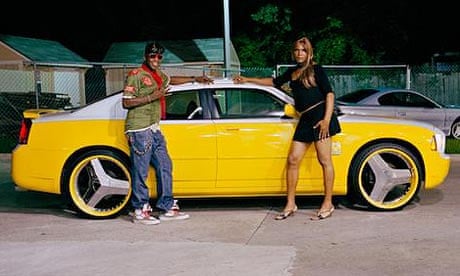Two and a half years ago I travelled to New Orleans and spent a week meeting bounce DJs and going to bounce clubs. It was there I discovered that the mass exodus caused by Hurricane Katrina was helping this largely localised and insular hip-hop scene spread to surrounding cities.
Bounce has been around since the early 90s and is known for its repetitive, raw, jittery beats and repetitive, simple, often sexually explicit lyrics. It's music for girls to bounce their bits to and they often obligingly do this. Search for "New Orleans bounce" on YouTube and you'll be met with more frantically jiggling bum cheeks than the back window of an away team rugby coach heading back home after scraping a narrow victory with an illegal try.
The beats in bounce tracks are almost exclusively made up of samples from two tracks: UK rapper Derek B's Rock The Beat and Showboys' Drag Rap. This gives the genre a very distinctive sound.
The simple call-and-response and club-chant style of bounce rapping, and many of the catchphrases, were borrowed by crunk acts like Lil Jon and Three 6 Mafia, who subsequently became much more famous than their New Orleans counterparts.
Despite bounce's influence on other hip-hop genres and the recent success in the Southern rap scene, the genre has never penetrated the mainstream. It's enjoyed the odd bit of moderate nationwide success in the form of songs like Juvenile's Back That Azz Up (which had a verse by Lil Wayne) and Choppa Style by former No Limit rapper Choppa, but has rarely had a lot of attention outside New Orleans. (Fun fact: Choppa was one of the rappers journalist Nik Cohn worked with and wrote about in his most recent book Triksta.)
More recently, following the Hurricane Katrina-induced mass migration of people out of the poorer, more bounce-friendly parts of New Orleans, such as the 9th Ward, the genre has found new homes in places like Dallas and Atlanta, alongside former New Orleans residents.
Also, thanks in part to the attention New Orleans has garnered because of Hurricane Katrina, as well as the worldwide success of diminutive Louisiana rapper Lil Wayne, the spotlight has never been focused more firmly on the city.
This has led to a fresh interest in bounce. Over the past year or so, lots of new blogs covering the genre have appeared, such as Twankle & Glisten, Louisiana Rap and Nola Bounce.
A few months ago, a DJ called Emynd put together a bounce mix for Diplo's Mad Decent Radio podcast series – always a good sign that a genre is gaining some internet interest.
It's a more recent development in bounce that has been gaining most attention though. As unlikely as it may sound, there are a lot of openly gay, overtly camp, cross-dressing male rappers in bounce who are part of a phenomenon affectionately known as "sissy rap"..
The pioneering sissy rapper is Katey Red, a former transsexual prostitute, who signed to the very well-respected Take Fo' label in the late 90s. Since then, loads more sissy rappers including SWA (Sissies With Attitude), Big Freedia and Sissy Nobby have appeared. They all have a dedicated following and play out most weekends at clubs and block parties - regularly in drag.
These rappers are much more accepted than you'd expect in the ever-so-slightly homophobic world of rap. Not everyone can come to terms with this new form of bounce rappers though. The rise of sissy rappers has led to people like seminal rap group Partners-N-Crime almost turning their back on the genre.
Just like their straight, pumped-up peers, sissy rappers also do rap beef. Both SWA and a rapper called Vockah Redu have written diss tracks aimed at Katey Red. If these guys can become a bit more self-obsessed and arrogant, who knows how far they could go in the rap world?

Comments (…)
Sign in or create your Guardian account to join the discussion